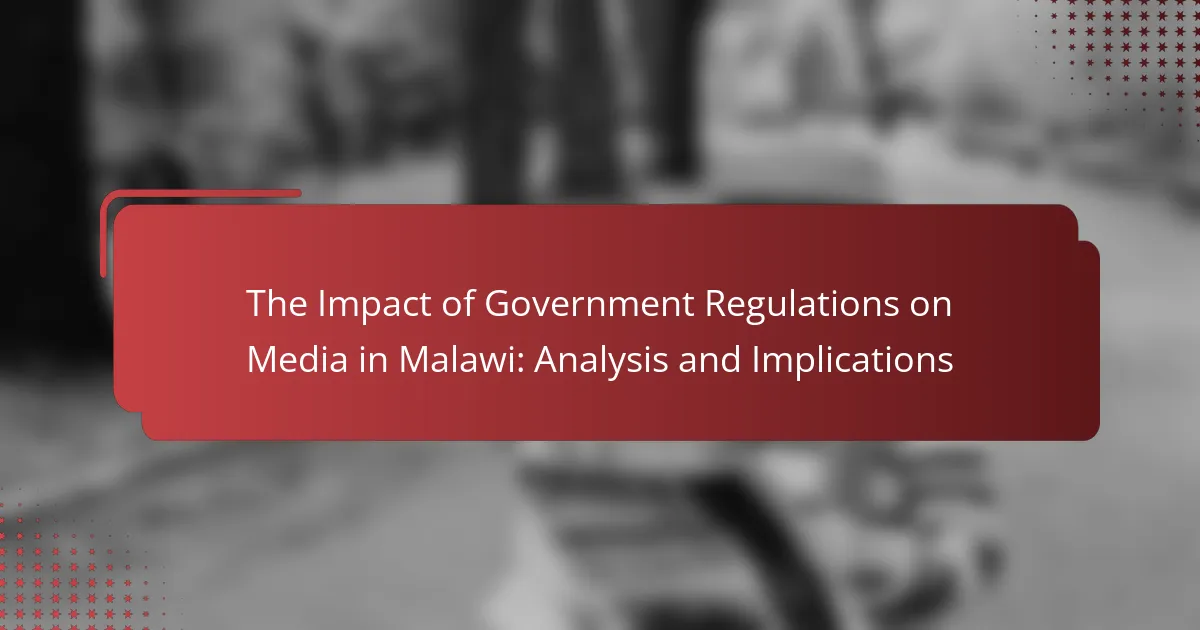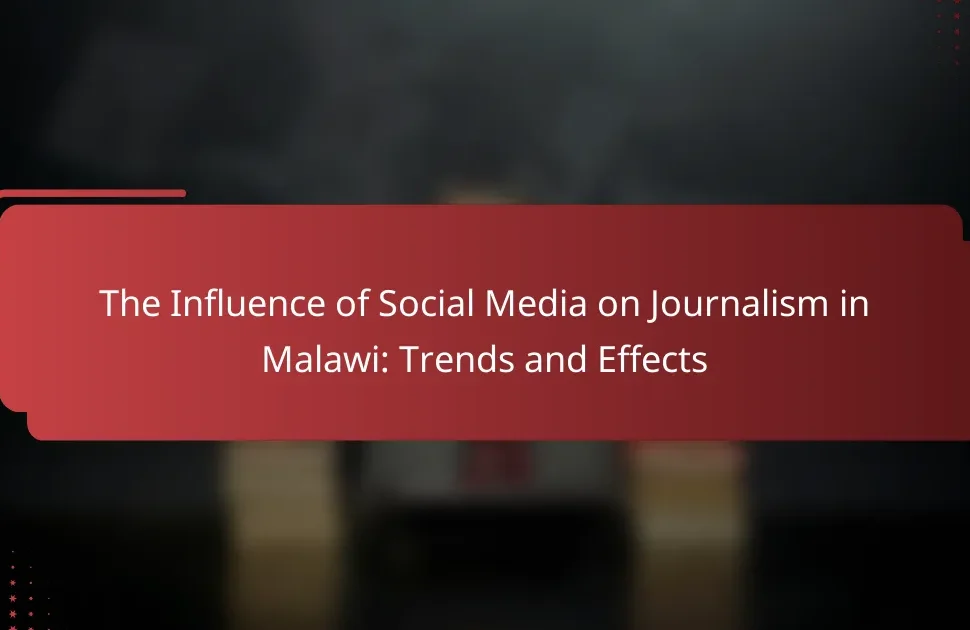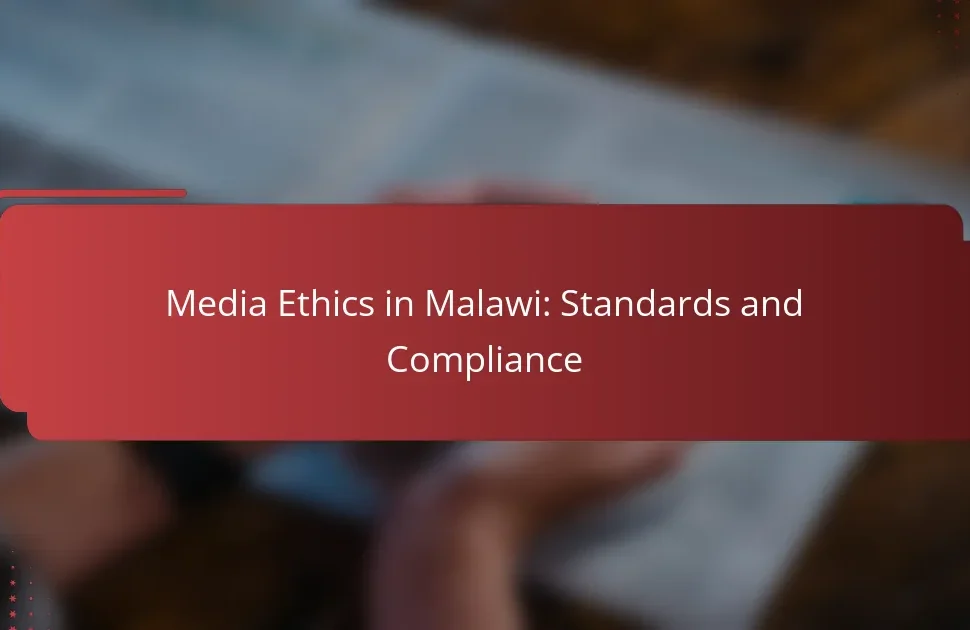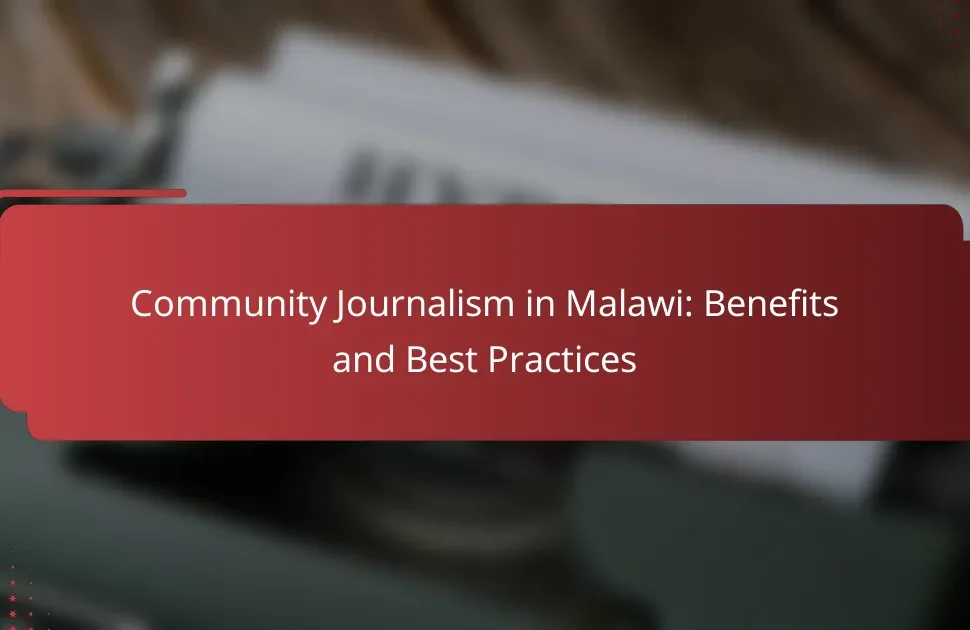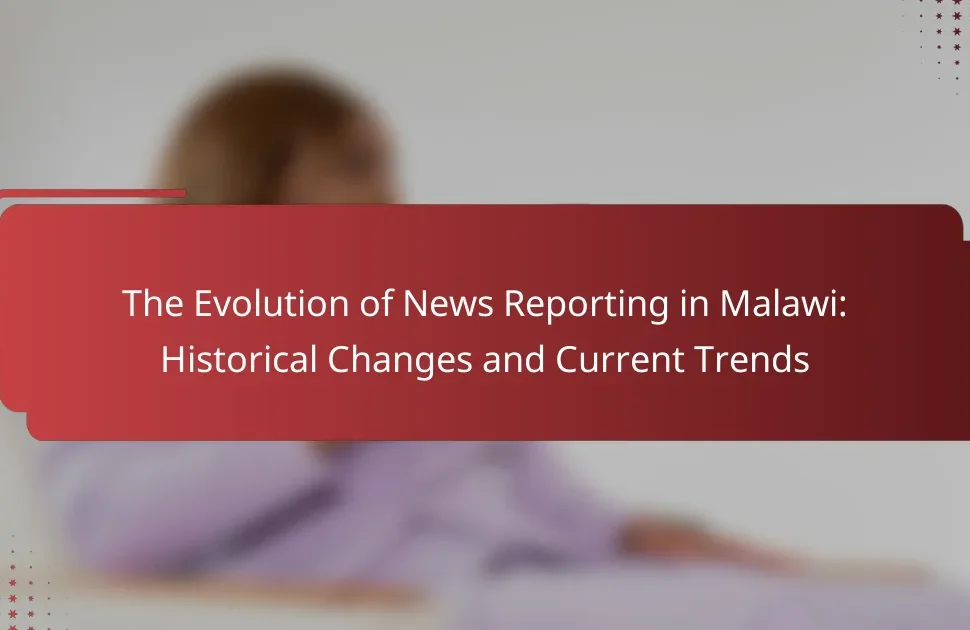The article examines the impact of government regulations on media in Malawi, focusing on key legislation such as the Communications Act and the Access to Information Act. These regulations govern broadcasting, telecommunications, and public access to information, balancing media freedom with national security and public order. The Malawi Communications Regulatory Authority (MACRA) enforces compliance, which can lead to censorship and affect press independence. Future trends indicate a potential shift towards increased digital content oversight and enhanced protections for journalists, reflecting ongoing discussions about media independence and possible reforms in existing laws.
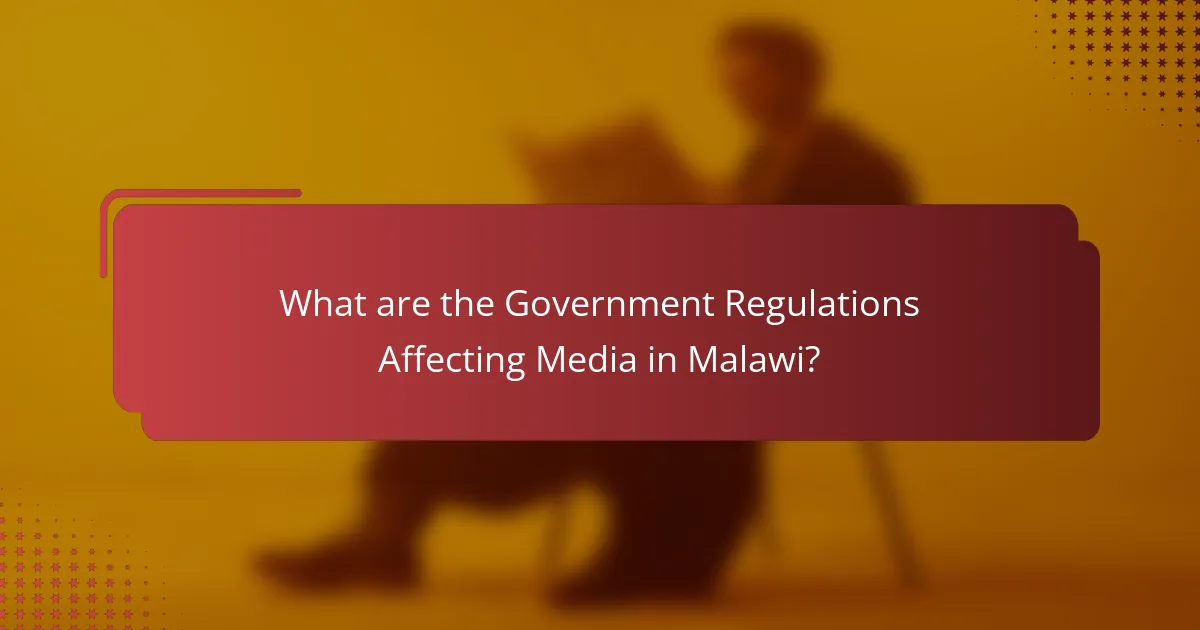
What are the Government Regulations Affecting Media in Malawi?
The government regulations affecting media in Malawi include the Communications Act and the Access to Information Act. The Communications Act governs broadcasting and telecommunications, ensuring compliance with licensing and content standards. The Access to Information Act promotes transparency and public access to information held by public bodies. These regulations aim to balance media freedom with national security and public order. For example, the Malawi Communications Regulatory Authority (MACRA) enforces compliance with broadcasting standards. Violations can lead to fines or revocation of licenses. Such regulations impact how media operates in Malawi, influencing content and access to information.
How do these regulations shape the media landscape in Malawi?
Government regulations significantly shape the media landscape in Malawi by influencing content, ownership, and operational practices. These regulations impose restrictions on media freedom, often limiting journalists’ ability to report independently. For instance, the Access to Information Act of 2016 aims to promote transparency but can be hindered by bureaucratic obstacles. Government ownership of major media outlets creates biases in news coverage. Additionally, laws against defamation and sedition can lead to self-censorship among journalists. The Malawi Communications Regulatory Authority (MACRA) enforces licensing that can restrict new media entrants, thus limiting competition. Overall, these regulations create an environment where media operates under significant constraints, affecting the diversity and quality of information available to the public.
What specific laws and policies govern media operations in Malawi?
The specific laws and policies that govern media operations in Malawi include the Communications Act of 1998, the Access to Information Act of 2016, and the Malawi Constitution. The Communications Act regulates broadcasting and telecommunications. It establishes the Malawi Communications Regulatory Authority, which oversees compliance and licensing. The Access to Information Act promotes transparency and allows citizens to request information from public bodies. The Malawi Constitution guarantees freedom of expression and press freedom. These laws collectively shape the media landscape in Malawi, ensuring accountability and promoting democratic principles.
How do these laws impact media freedom and expression?
Government regulations in Malawi significantly restrict media freedom and expression. These laws impose limitations on journalists and media outlets. For instance, the Access to Information Act has been criticized for its vague provisions. Such provisions can lead to censorship and self-censorship among media professionals. Additionally, laws against defamation can deter critical reporting. This creates a chilling effect on freedom of expression. Furthermore, government control over broadcasting licenses limits diversity in media voices. As a result, the overall media landscape in Malawi is constrained and less vibrant.
Why is it important to analyze government regulations on media?
Analyzing government regulations on media is crucial for understanding their impact on freedom of expression. Regulations can dictate what content is permissible, influencing public discourse. In Malawi, media regulations have historically affected how information is disseminated. For instance, laws can restrict journalists’ ability to report on sensitive issues. This can lead to a lack of transparency and accountability in governance. Furthermore, analyzing these regulations helps identify potential biases in media coverage. It also sheds light on the balance between regulation and the need for a free press. Understanding these dynamics is essential for promoting a healthy democratic environment.
What are the potential consequences of strict media regulations?
Strict media regulations can lead to reduced freedom of expression. This limitation may stifle public discourse and dissenting opinions. Journalists may face increased censorship and self-censorship. The quality of journalism can decline due to restricted access to information. Citizens may become less informed about critical issues. This scenario can create an environment of fear among media professionals. Historical examples indicate that such regulations often lead to authoritarian governance. In Malawi, strict media laws have previously resulted in protests and international criticism.
How do these regulations influence public opinion and discourse?
Government regulations influence public opinion and discourse by shaping the information landscape. These regulations can limit or enhance media freedom. When regulations restrict media, they often lead to reduced public access to diverse viewpoints. This can create an environment where dissenting opinions are silenced. Consequently, public opinion may become more homogeneous. Research indicates that media regulation can impact voter perceptions and civic engagement. In Malawi, regulations have historically affected how citizens receive news and information. This has led to a more controlled narrative in public discourse. Thus, the influence of regulations is significant in determining the quality and diversity of public dialogue.
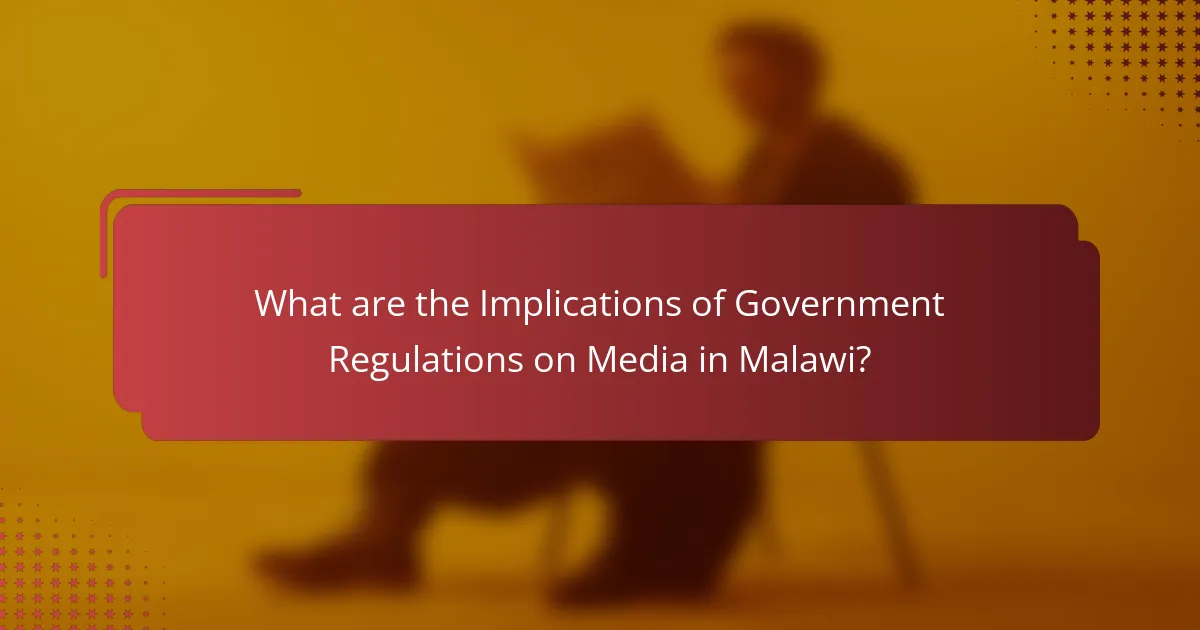
What are the Implications of Government Regulations on Media in Malawi?
Government regulations on media in Malawi significantly affect freedom of expression and press independence. These regulations can lead to censorship, limiting journalists’ ability to report freely. The Media Council of Malawi oversees compliance with these regulations, which may impose penalties for non-adherence. Such penalties can create a chilling effect on media outlets, discouraging investigative journalism. Additionally, government control over broadcasting licenses can restrict access to information. This control often results in biased reporting that favors the ruling party. Furthermore, public trust in media may decline due to perceived government influence. Overall, these implications hinder the development of a vibrant and independent media landscape in Malawi.
How do these implications affect journalists and media organizations?
Government regulations in Malawi significantly affect journalists and media organizations. These regulations can impose restrictions on freedom of expression. Journalists may face legal consequences for reporting on sensitive topics. This environment can lead to self-censorship among media professionals. Media organizations may struggle with funding due to limited advertising opportunities. Additionally, regulations can impact the diversity of viewpoints presented in the media. The overall quality of journalism may decline as a result of these constraints. These implications create challenges for maintaining a free and independent press in Malawi.
What challenges do journalists face under current regulations?
Journalists in Malawi face significant challenges under current regulations. These challenges include restrictive laws that limit freedom of expression. Journalists often encounter harassment and intimidation from authorities. Additionally, there are legal repercussions for reporting on sensitive topics. The Media Council of Malawi reported increased censorship and pressure on journalists in 2022. Furthermore, journalists struggle with limited access to information due to government secrecy. These factors create a hostile environment for media professionals in the country.
How do media organizations adapt to regulatory pressures?
Media organizations adapt to regulatory pressures by implementing compliance strategies and modifying content. They often establish legal teams to interpret regulations accurately. Training staff on compliance is common to ensure adherence to laws. Organizations may also seek to engage with regulators to influence policy. Additionally, they can diversify content to align with regulatory expectations. Some media outlets may choose to self-censor to avoid penalties. In Malawi, media organizations face specific challenges due to stringent laws. Adapting to these pressures is crucial for maintaining operational viability.
What role does public policy play in shaping media regulations?
Public policy significantly influences media regulations by establishing legal frameworks and guidelines. These policies dictate how media operates, ensuring compliance with national standards. For example, in Malawi, public policy shapes media regulations through the Communications Act. This act outlines the licensing process for broadcasters and content standards. Additionally, public policy addresses issues like censorship and media freedom. It aims to balance the need for regulation with the protection of free expression. Historical changes in policy have led to varying degrees of media freedom in Malawi. Consequently, public policy acts as a critical determinant of the media landscape and its regulatory environment.
How can policy changes improve media freedom in Malawi?
Policy changes can improve media freedom in Malawi by establishing stronger legal protections for journalists. These changes can include repealing restrictive laws that limit press freedom. For instance, laws that impose heavy penalties for defamation can deter investigative journalism. By decriminalizing such offenses, journalists can report more freely without fear of legal repercussions.
Additionally, policies that promote transparency and access to information can empower media outlets. Implementing freedom of information laws allows journalists to obtain necessary data for reporting. This enhances accountability and can lead to a more informed public.
International organizations, such as Reporters Without Borders, emphasize the importance of legislative reforms for media freedom. Countries with supportive legal frameworks tend to have more vibrant media landscapes. In Malawi, adopting best practices from nations with strong press protections can facilitate a healthier media environment.
What are the prospects for media reform in the current political climate?
The prospects for media reform in the current political climate in Malawi are cautiously optimistic. Recent political shifts indicate a growing recognition of the importance of media freedom. The current government has expressed intentions to amend restrictive media laws. This includes efforts to enhance transparency and accountability in media operations. Additionally, civil society organizations are actively advocating for reform. These organizations emphasize the need for a free press as a cornerstone of democracy. However, challenges remain, including resistance from entrenched interests. Ongoing public discourse around media rights is crucial for sustaining momentum. Overall, the environment for media reform is improving, but sustained advocacy is essential for meaningful change.
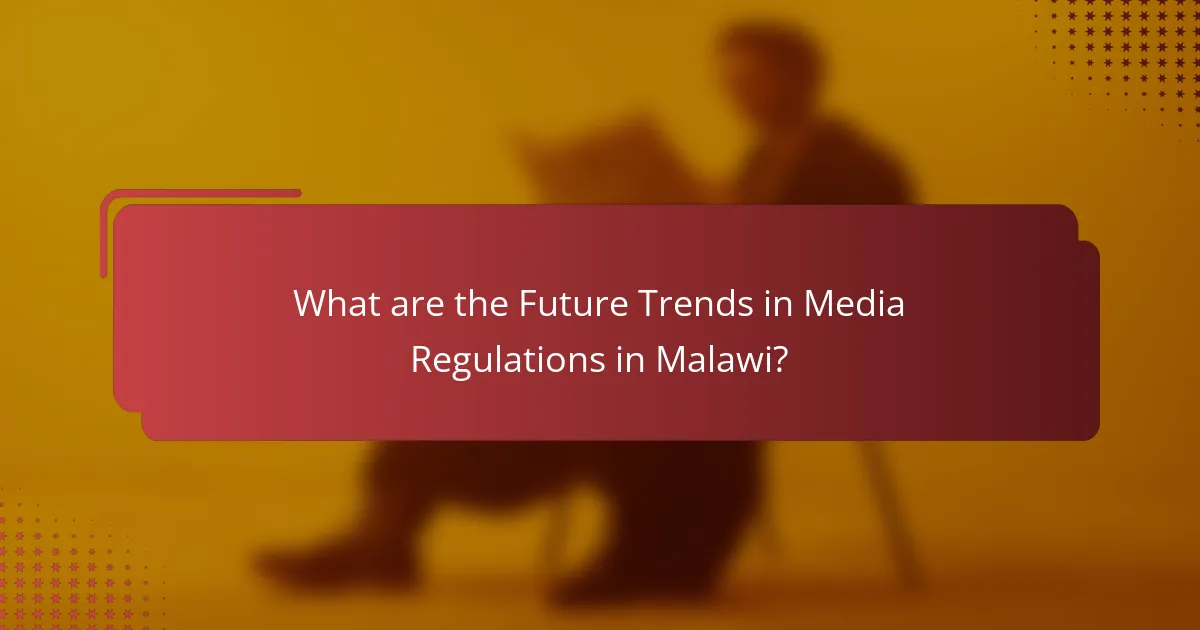
What are the Future Trends in Media Regulations in Malawi?
Future trends in media regulations in Malawi include increased digital content oversight and enhanced press freedom protections. The government is expected to focus on regulating online platforms to combat misinformation. This aligns with global trends in digital governance. Additionally, there may be a push for laws that protect journalists from harassment. The ongoing dialogue about media independence suggests a gradual shift towards more liberal regulations. Recent discussions in the National Assembly indicate a willingness to reform existing media laws. These reforms aim to balance state interests with the rights of media practitioners. Overall, the trajectory points towards a more open media environment in Malawi.
How might government regulations evolve in response to technological changes?
Government regulations may evolve to address new challenges posed by technological changes. As technology advances, existing laws may become outdated. For example, the rise of digital media necessitates updated regulations on content ownership and copyright. Additionally, regulations may expand to include data privacy protections as technology collects more personal information. Governments may also implement stricter guidelines for online platforms to combat misinformation. Historical instances show that regulatory bodies often respond to public demand for safety and fairness. The introduction of the General Data Protection Regulation (GDPR) in the EU exemplifies a proactive regulatory approach to technological advancements. Such changes ensure that regulations remain relevant and effective in protecting citizens and maintaining order.
What impact do social media platforms have on traditional media regulations?
Social media platforms significantly influence traditional media regulations. They introduce challenges to existing regulatory frameworks. Traditional media often faces competition from social media in content distribution. This competition pressures regulators to adapt rules for fairness. Additionally, social media platforms can bypass traditional media gatekeeping. This leads to concerns about misinformation and content quality. Regulators must address these issues to protect public interest. Consequently, traditional media regulations are evolving to encompass digital platforms. This evolution reflects the changing media landscape and audience behavior.
How can media organizations prepare for potential regulatory shifts?
Media organizations can prepare for potential regulatory shifts by conducting thorough risk assessments. They should monitor regulatory trends and changes in government policies. Engaging with stakeholders, including policymakers, can provide insights into upcoming regulations. Training staff on compliance and legal issues is essential to ensure adherence to new rules. Developing flexible operational strategies allows for quick adaptation to regulatory changes. Establishing strong legal teams can help navigate complex regulatory environments. Collaborating with industry associations can amplify their voice in advocacy efforts. These proactive measures have been shown to mitigate risks and enhance resilience in the face of regulatory changes.
What best practices can media organizations adopt to navigate regulations effectively?
Media organizations can adopt several best practices to navigate regulations effectively. First, they should establish a compliance team dedicated to understanding and monitoring regulations. This team can ensure that all content adheres to local laws and standards. Second, regular training sessions for staff on regulatory updates can enhance awareness and compliance. Third, building strong relationships with regulatory bodies can facilitate open communication and guidance. Fourth, implementing robust internal policies and procedures can streamline compliance efforts. Finally, conducting regular audits of content and practices can identify potential regulatory risks. These strategies collectively help media organizations maintain compliance and adapt to changing regulatory environments.
How can collaboration with civil society enhance media freedom?
Collaboration with civil society can enhance media freedom by fostering accountability and transparency in media practices. Civil society organizations often advocate for press rights and provide legal support to journalists. This partnership can lead to the development of policies that protect media independence. For instance, in Malawi, civil society groups have campaigned against restrictive media laws. Their efforts have resulted in increased public awareness about media freedom issues. Research from the Media Institute of Southern Africa highlights that civil society involvement can lead to more robust media environments. This collaboration can also empower journalists through training and resources, ultimately strengthening the media landscape.
What strategies can be employed to advocate for better media policies?
Advocating for better media policies involves several key strategies. First, building coalitions with various stakeholders can amplify voices. This includes media organizations, civil society, and academic institutions. Engaging in public awareness campaigns raises the profile of media policy issues. These campaigns can highlight the importance of free and independent media.
Lobbying government officials is crucial. Presenting evidence-based arguments can influence policymakers. Research shows that informed advocacy leads to more effective media regulations. Participating in public consultations allows citizens to voice their concerns. This process fosters transparency and accountability in media governance.
Utilizing social media platforms can mobilize public support quickly. Online petitions and campaigns can demonstrate widespread demand for policy change. Finally, monitoring and evaluating existing media policies provides data for advocacy efforts. This evidence can support calls for reform and better practices.
The primary entity of this article is the government regulations affecting media in Malawi. It provides a detailed analysis of various laws, including the Communications Act and the Access to Information Act, which shape the media landscape by influencing content, ownership, and operational practices. The article examines the implications of these regulations on media freedom, expression, and the challenges faced by journalists and media organizations. It also discusses the role of public policy in shaping media regulations and explores future trends, including the impact of digital content and social media on traditional media regulations. Overall, the article highlights the need for advocacy and reform to promote a more independent and vibrant media environment in Malawi.
